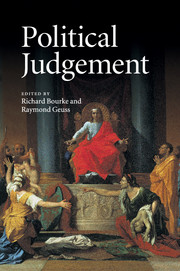Book contents
- Frontmatter
- Contents
- List of contributors
- Acknowledgements
- Introduction
- Part I The character of political judgement
- 1 What is political judgement?
- 2 Sticky judgement and the role of rhetoric
- 3 Theory and practice: the revolution in political judgement
- Part II Trust, judgement and consent
- Part III Rationality and judgement
- Part IV Democracy and modern political judgement
- Bibliography of the works of John Dunn
- Index
2 - Sticky judgement and the role of rhetoric
from Part I - The character of political judgement
Published online by Cambridge University Press: 26 December 2009
- Frontmatter
- Contents
- List of contributors
- Acknowledgements
- Introduction
- Part I The character of political judgement
- 1 What is political judgement?
- 2 Sticky judgement and the role of rhetoric
- 3 Theory and practice: the revolution in political judgement
- Part II Trust, judgement and consent
- Part III Rationality and judgement
- Part IV Democracy and modern political judgement
- Bibliography of the works of John Dunn
- Index
Summary
John Dunn has long criticised the easy assumption that in our psychological and political habits of thought we human beings can make ourselves responsive to the lightest breeze of reason. This chapter joins his chorus, focusing on the case of judgement and judgementally sensitive attitudes. We muster evidence that judgement does not come and go as rationality requires; in face of rational demands it proves remarkably sticky. And we argue that there is a case for resorting to the techniques of rhetoric in order to undo that stickiness and to give reason a chance. Rhetoric has a place in the private forum of deliberation, not just in the context of public debate; it can serve in a therapeutic as well as a strategic role.
The thesis about judgement makes a break with the standard approach in which judgement is contrasted with perception. Everyone agrees that perception is sticky in the sense that it often continues to represent things to be a certain way, even when there is irrefutable evidence that that is not how they are; it keeps representing the rod in the water as bent, even when it is clear that the rod is perfectly straight. By contrast with perception, it may seem that judgement is hair-triggered to the demands of evidence; although I continue to see the rod as bent, for example, I will readily judge that it is straight. But we hold that this appearance is misleading and that judgement itself suffers from drag effects akin to those which affect perception. This is what makes a case for the resort to rhetoric.
- Type
- Chapter
- Information
- Political JudgementEssays for John Dunn, pp. 47 - 72Publisher: Cambridge University PressPrint publication year: 2009
- 2
- Cited by



